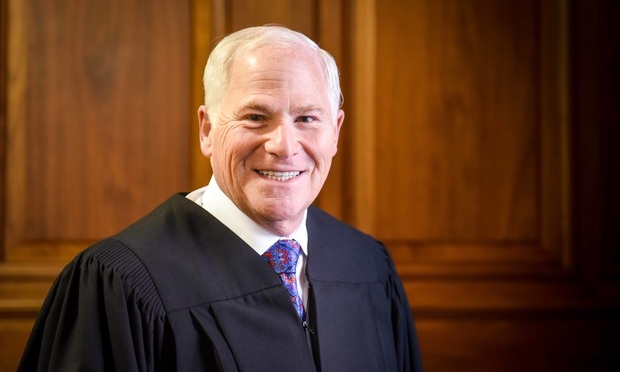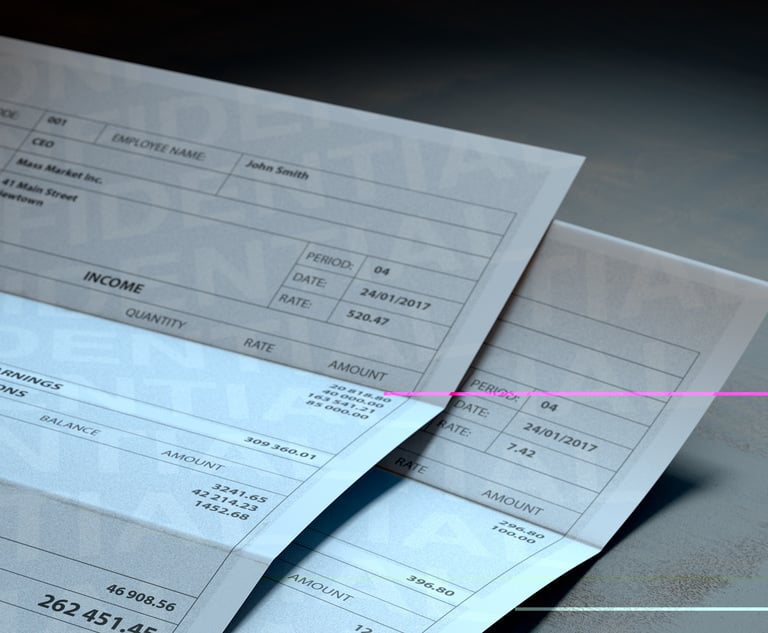NY Appeals Court Keeps Block Against Mary Trump in Book Fight, But Lifts It for Her Publisher
"The legitimate interest in preserving family secrets may be one thing for the family of a real estate developer, no matter how successful; it is another matter for the family of the president of the United States," Presiding Justice Alan Scheinkman wrote.
July 01, 2020 at 08:11 PM
6 minute read
 Justice Alan Scheinkman.
Justice Alan Scheinkman.
The New York Supreme Court, Appellate Division, Second Department upheld a Supreme Court justice's temporary restraining order against President Donald Trump's niece Mary Trump over publication of her upcoming book, but vacated the order issued against publisher Simon & Schuster.
The president's brother Robert Trump sued their niece June 26, seeking to block the planned July 28 publication of "Too Much and Never Enough: How My Family Created the World's Most Dangerous Man."
Presiding Justice Alan Scheinkman in a ruling issued late Wednesday modified the TRO against Mary Trump to include "any agent" of hers. While Robert Trump has alleged Simon & Schuster is Mary Trump's agent, Scheinkman found there was insufficient evidence to determine whether Robert Trump will be successful in that argument, and lifted the block for the publisher.
Scheinkman noted full submissions from Mary Trump and Simon & Schuster have not yet been received and his ruling does not represent a judgment on Robert Trump's request for a preliminary injunction. Written arguments from both sides are due to Dutchess County Supreme Court Justice Hal Greenwald within the next week.
Mary Trump's attorney, Gibson, Dunn & Crutcher partner Theodore Boutrous, said he planned to file a brief in the lower court Thursday. The brief was not filed by midday Thursday.
"It is very good news that the prior restraint against Simon & Schuster has been vacated and we look forward to filing our brief tomorrow in the trial court explaining why the same result is required as to Ms. Trump, based on the First Amendment and basic contract law," he said.
Robert Trump's attorney, Charles Harder, has argued that Mary Trump signed a confidentiality provision of the settlement agreement associated with her grandfather's will, which prohibits her from publishing information about her relationship with the president, Robert Trump or their sister, former Judge Maryanne Trump Barry of the U.S. Court of Appeals for the Third Circuit, without their consent. Simon & Schuster's attorneys have noted the publisher is not a party to the settlement agreement.
While Robert Trump has not reviewed the contents of the book, Harder argued it presumably contains material protected by the settlement agreement.
Scheinkman agreed that, based on the book's title and Mary Trump's public comments, it may contain material within reach of the settlement agreement.
"While Ms. Trump unquestionably possesses the same First Amendment expressive rights belonging to all Americans, she also possesses the right to enter into contracts, including the right to contract away her First Amendment rights," Scheinkman wrote.
Scheinkman found that, while anyone can enter into a confidentiality agreement, courts are "not necessarily obligated" to enforce such agreements. Courts must balance the interests of the party seeking to enforce the contract with "other legitimate interests, including, especially in this context, the public interest," he wrote.
"Drawing the appropriate balance may well require in camera review of the book sought to be enjoined. … [T]he legitimate interest in preserving family secrets may be one thing for the family of a real estate developer, no matter how successful; it is another matter for the family of the president of the United States," Scheinkman wrote.
In terms of the balancing act, First Amendment attorney Jeffrey Robbins, a partner at Saul Ewing Arnstein & Lehr, said the public-interest side must be weighed heavily, but there may also be ways to invalidate the confidentiality agreement without reaching the First Amendment issue.
The agreement could be invalidated because it had no expiration date and 19 years have passed, Robbins said, or it could be upheld as it pertains to the president's siblings but invalidated as to the president because of his public office.
Robbins said Simon & Schuster may act quickly to distribute copies of the book to book reviewers and render the issue moot. As of June 30, Simon & Schuster had approximately 75,000 copies printed and bound and ready for publication, thousands of which had already been shipped, according to court filings.
"If Simon & Schuster publishes, there is no longer any live injunction issue, even against Mary Trump," he said.
Robert Trump could try to persuade the court that Simon & Schuster is Mary Trump's agent, Robbins said, or he could appeal Scheinkman's order. Simon & Schuster would want to try to distribute the books to reviewers or customers before he could pursue either of those options, Robbins said.
"If I were advising Simon & Schuster, I would advise them to act without coordinating or doing anything which looked like they were coordinating with Mary Trump," Robbins said, as long as Mary Trump is still under the TRO.
The president wants to avoid pursuing his own lawsuit against his niece, Robbins said, both to avoid discovery and because he has argued that, as president, he can't be subject to certain kinds of litigation in other ongoing cases.
"These lawsuits can be boomerangs, significant boomerangs," Robbins said. "They can open plaintiffs up to discovery of a sort that is very unwelcome."
Simon & Schuster, which is represented by Elizabeth McNamara of Davis Wright Tremaine, praised Scheinkman's ruling in a statement.
"We are gratified with the Appellate Court's decision to overturn the Temporary Restraining Order issued by the lower court against Simon & Schuster," the statement said. "We support Mary L. Trump's right to tell her story in TOO MUCH AND NEVER ENOUGH, a work of great interest and importance to the national discourse that fully deserves to be published for the benefit of the American public. As all know, there are well-established precedents against prior restraint and pre-publication injunctions, and we remain confident that the preliminary injunction will be denied."
READ MORE:
Judge Issues Temporary Restraining Order in Lawsuit to Block Publication of Trump Niece's Book
First Amendment Advocates Protest 'Extraordinary' Order Blocking Publication of Mary Trump's Book
This content has been archived. It is available through our partners, LexisNexis® and Bloomberg Law.
To view this content, please continue to their sites.
Not a Lexis Subscriber?
Subscribe Now
Not a Bloomberg Law Subscriber?
Subscribe Now
NOT FOR REPRINT
© 2025 ALM Global, LLC, All Rights Reserved. Request academic re-use from www.copyright.com. All other uses, submit a request to [email protected]. For more information visit Asset & Logo Licensing.
You Might Like
View All
Five Years After Vega Much Remains Unsettled in Pay Frequency Litigation

Spotify GC Steps Down, Opts to 'Step Away From Full-Time Corporate Life'
2 minute read
Dechert Sues Former Attorney For Not Returning Compensation

Law Firms Mentioned
Trending Stories
- 1Class Action Litigator Tapped to Lead Shook, Hardy & Bacon's Houston Office
- 2Arizona Supreme Court Presses Pause on KPMG's Bid to Deliver Legal Services
- 3Bill Would Consolidate Antitrust Enforcement Under DOJ
- 4Cornell Tech Expands Law, Technology and Entrepreneurship Masters of Law Program to Part Time Format
- 5Divided Eighth Circuit Sides With GE's Timely Removal of Indemnification Action to Federal Court
Who Got The Work
J. Brugh Lower of Gibbons has entered an appearance for industrial equipment supplier Devco Corporation in a pending trademark infringement lawsuit. The suit, accusing the defendant of selling knock-off Graco products, was filed Dec. 18 in New Jersey District Court by Rivkin Radler on behalf of Graco Inc. and Graco Minnesota. The case, assigned to U.S. District Judge Zahid N. Quraishi, is 3:24-cv-11294, Graco Inc. et al v. Devco Corporation.
Who Got The Work
Rebecca Maller-Stein and Kent A. Yalowitz of Arnold & Porter Kaye Scholer have entered their appearances for Hanaco Venture Capital and its executives, Lior Prosor and David Frankel, in a pending securities lawsuit. The action, filed on Dec. 24 in New York Southern District Court by Zell, Aron & Co. on behalf of Goldeneye Advisors, accuses the defendants of negligently and fraudulently managing the plaintiff's $1 million investment. The case, assigned to U.S. District Judge Vernon S. Broderick, is 1:24-cv-09918, Goldeneye Advisors, LLC v. Hanaco Venture Capital, Ltd. et al.
Who Got The Work
Attorneys from A&O Shearman has stepped in as defense counsel for Toronto-Dominion Bank and other defendants in a pending securities class action. The suit, filed Dec. 11 in New York Southern District Court by Bleichmar Fonti & Auld, accuses the defendants of concealing the bank's 'pervasive' deficiencies in regards to its compliance with the Bank Secrecy Act and the quality of its anti-money laundering controls. The case, assigned to U.S. District Judge Arun Subramanian, is 1:24-cv-09445, Gonzalez v. The Toronto-Dominion Bank et al.
Who Got The Work
Crown Castle International, a Pennsylvania company providing shared communications infrastructure, has turned to Luke D. Wolf of Gordon Rees Scully Mansukhani to fend off a pending breach-of-contract lawsuit. The court action, filed Nov. 25 in Michigan Eastern District Court by Hooper Hathaway PC on behalf of The Town Residences LLC, accuses Crown Castle of failing to transfer approximately $30,000 in utility payments from T-Mobile in breach of a roof-top lease and assignment agreement. The case, assigned to U.S. District Judge Susan K. Declercq, is 2:24-cv-13131, The Town Residences LLC v. T-Mobile US, Inc. et al.
Who Got The Work
Wilfred P. Coronato and Daniel M. Schwartz of McCarter & English have stepped in as defense counsel to Electrolux Home Products Inc. in a pending product liability lawsuit. The court action, filed Nov. 26 in New York Eastern District Court by Poulos Lopiccolo PC and Nagel Rice LLP on behalf of David Stern, alleges that the defendant's refrigerators’ drawers and shelving repeatedly break and fall apart within months after purchase. The case, assigned to U.S. District Judge Joan M. Azrack, is 2:24-cv-08204, Stern v. Electrolux Home Products, Inc.
Featured Firms
Law Offices of Gary Martin Hays & Associates, P.C.
(470) 294-1674
Law Offices of Mark E. Salomone
(857) 444-6468
Smith & Hassler
(713) 739-1250






